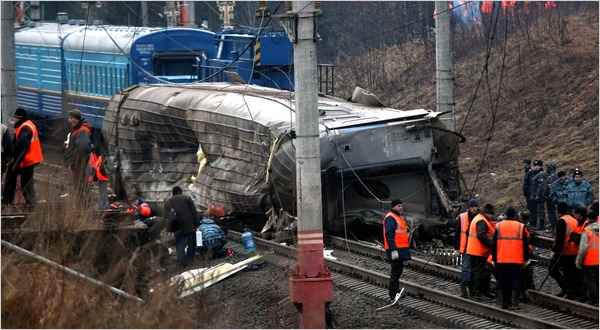Russia and ex-Soviet Union (English)
Russia, NATO and Afghanistan: High stakes Great Game
- Written by Eric Walberg Эрик Вальберг/ Уолберг إيريك والبرغ
US President Barack Obama's now expanding war against the Taliban is garnering support from liberals and neocons alike, from leaders around the world, even from Russia. “We are ready to support these efforts, guarantee the transit of troops, take part in economic projects and train police and the military,” Russian President Dmitri Medvedev declared in a recent press conference with Italian Prime Minister Silvio Berlusconi. Moscow and Washington reached an agreement in July allowing the US to launch up to 4,500 US flights a year over Russia, opening a major supply route for American operations in Afghanistan. Previously Russia had only allowed the US to ship non-lethal military supplies across its territory by train.
Terror in Russia: Nothing comes from nothing
- Written by Eric Walberg Эрик Вальберг/ Уолберг إيريك والبرغ
 The worst terrorist attack to hit Russia in five years, the bombing of the Nevsky Express train last week, was almost certainly by Islamist extremists, and security forces are just not prepared for these less spectacular acts of terrorism, Russian security experts say.
The worst terrorist attack to hit Russia in five years, the bombing of the Nevsky Express train last week, was almost certainly by Islamist extremists, and security forces are just not prepared for these less spectacular acts of terrorism, Russian security experts say.
The cause of the crash was identified as a homemade bomb that exploded on the tracks between Moscow and St Petersburg, killing 26, wounding scores and raising fears of a new era of terrorism in Russia.
Russia-India-China: The Bush curse
- Written by Eric Walberg Эрик Вальберг/ Уолберг إيريك والبرغ
Moscow is trying to draw India and China closer to put out the flames now flaring across the continent, from the Caucasus and Central Asia, to Iran and Pakistan, notes Eric Walberg
United States President Barack Obama has shown a flicker of independence in shaping US Eurasian politics. To secure transit routes through Russia to Afghanistan, he loudly proclaimed the end to US missile base plans for Poland and the Czech Republic, and downplayed any further NATO expansion in Russia’s backyard. He resisted jumping on the Gates-Clinton-McChrystal escalation bandwagon, insisting that it would be counterproductive to blindly back the thoroughly discredited Karzai, and hinting that negotiations with the Taliban and Iran could mean an about-face on the Bush strategy of total war in the region.
Obama’s strategy is now described as focussed on securing the main cities in Afghanistan,
NATO vs CSTO: The Fogh of war
- Written by Eric Walberg Эрик Вальберг/ Уолберг إيريك والبرغ
To do this, it expanded rapidly in the past decade, and now has a Partnership for Peace with ex-Soviet hopefuls. It also has various formulas to incorporate Western-oriented Muslim nations, including the Mediterranean Dialogue (which includes Israel) and the Istanbul Cooperation Initiative (Turkey and the Gulf Cooperation Council (GCC) minus Saudi and Oman). Morocco and Israel are further blessed as “major non-NATO allies” of the US. Even more ambitious is the GCC+4 (+ Egypt, Jordan, Iraq, US), heralded in 2007 as the “NATO of the Middle East”, but then once-upon-a-time so was the ill-fated Baghdad Pact, originally called the Middle East Treaty Organisation (METO). The real “NATO of the Middle East ” is of course US+1.
Russia and Georgia: Caucasian calculus
- Written by Eric Walberg Эрик Вальберг/ Уолберг إيريك والبرغ
More Articles...
Page 10 of 16





